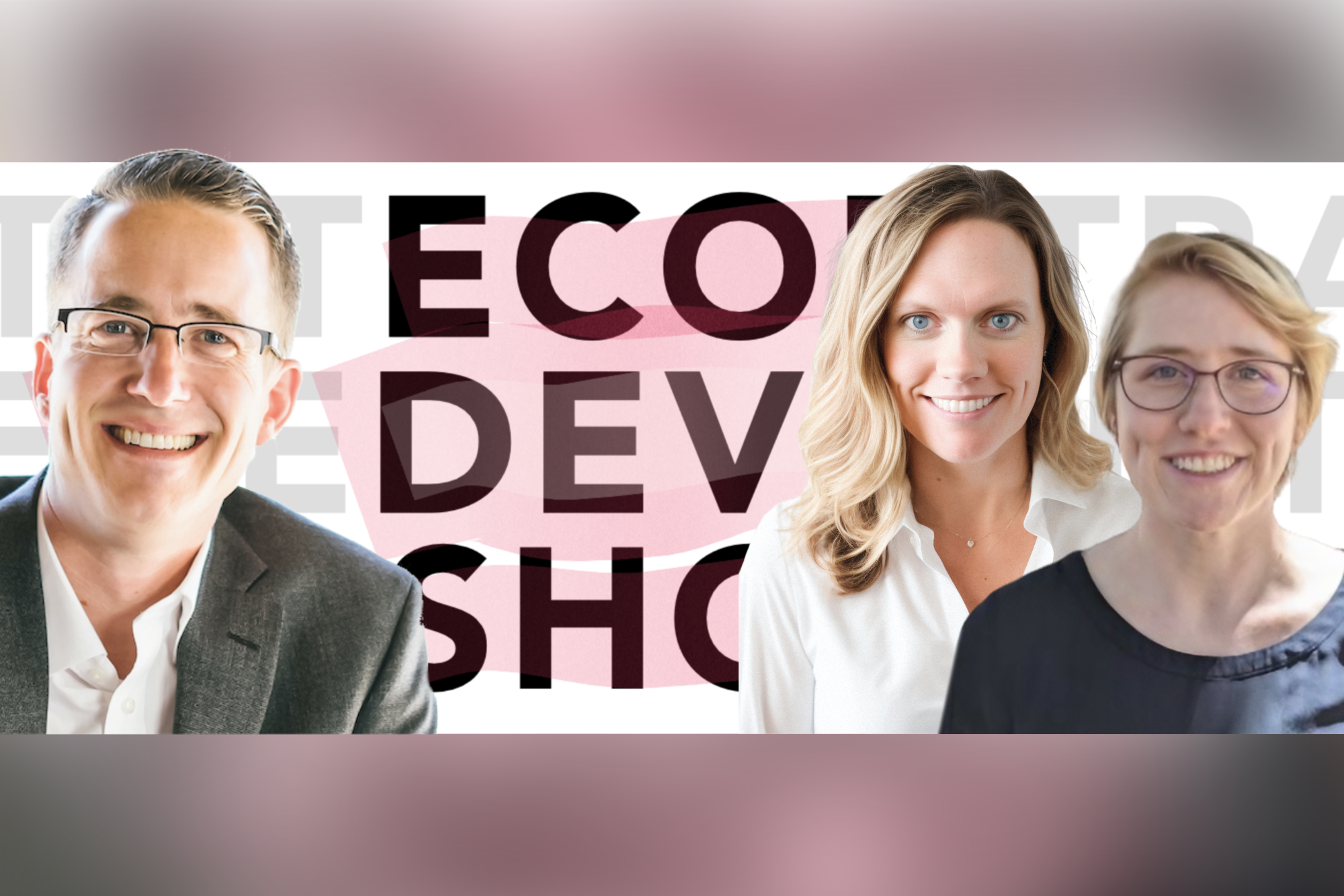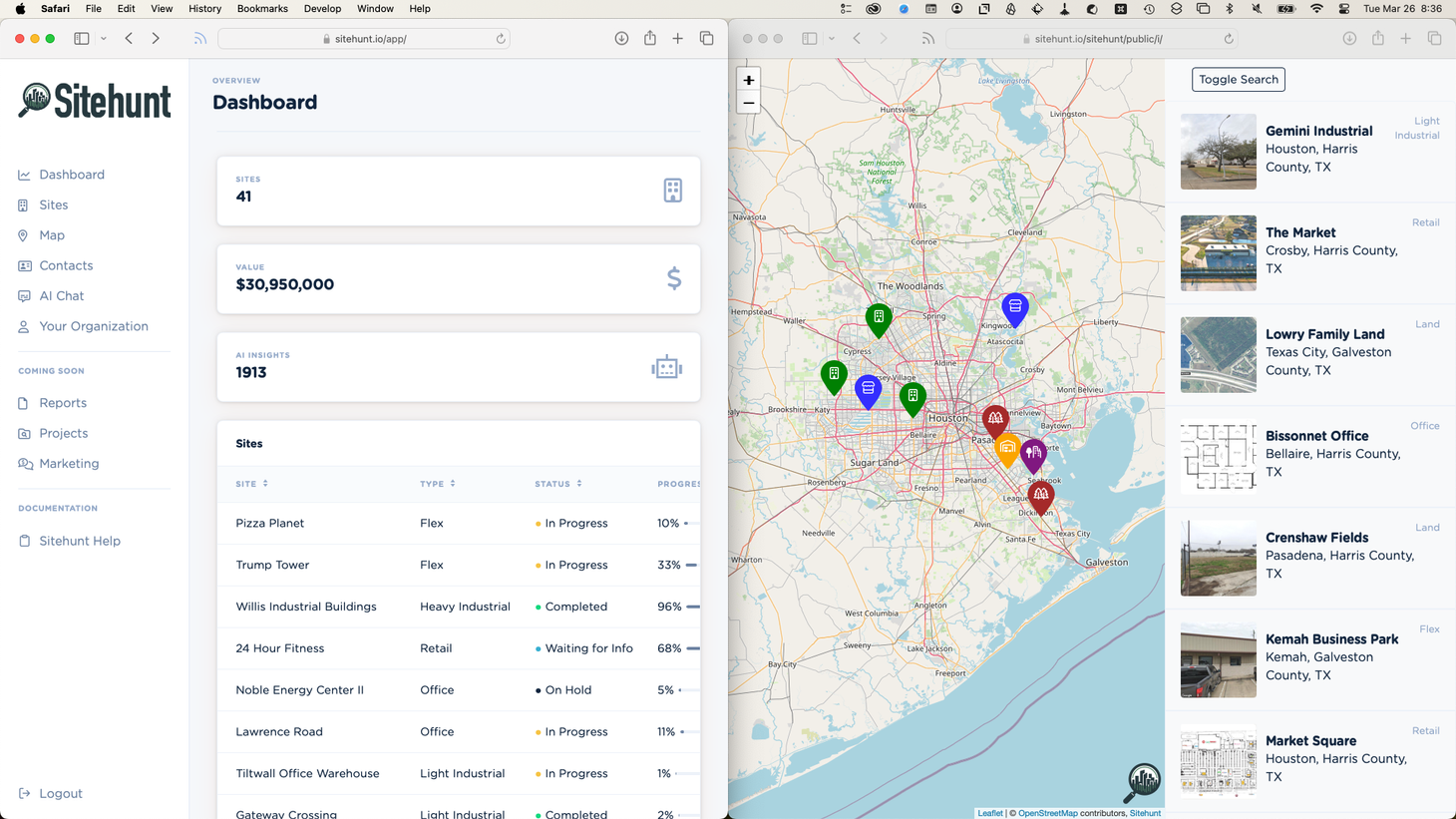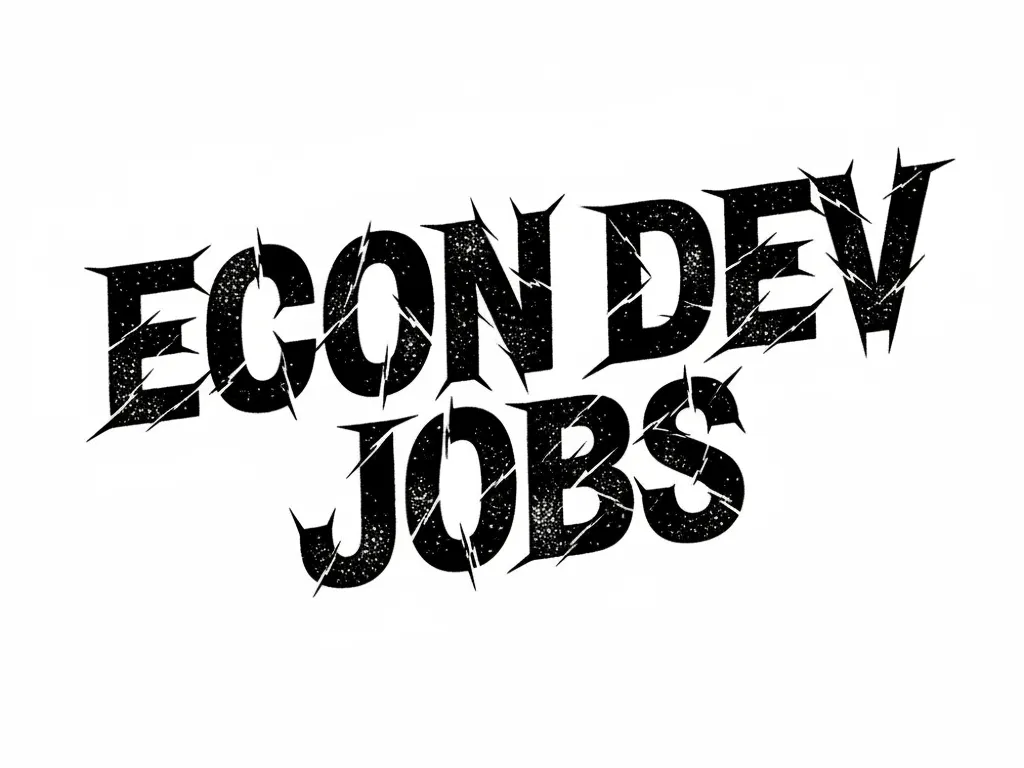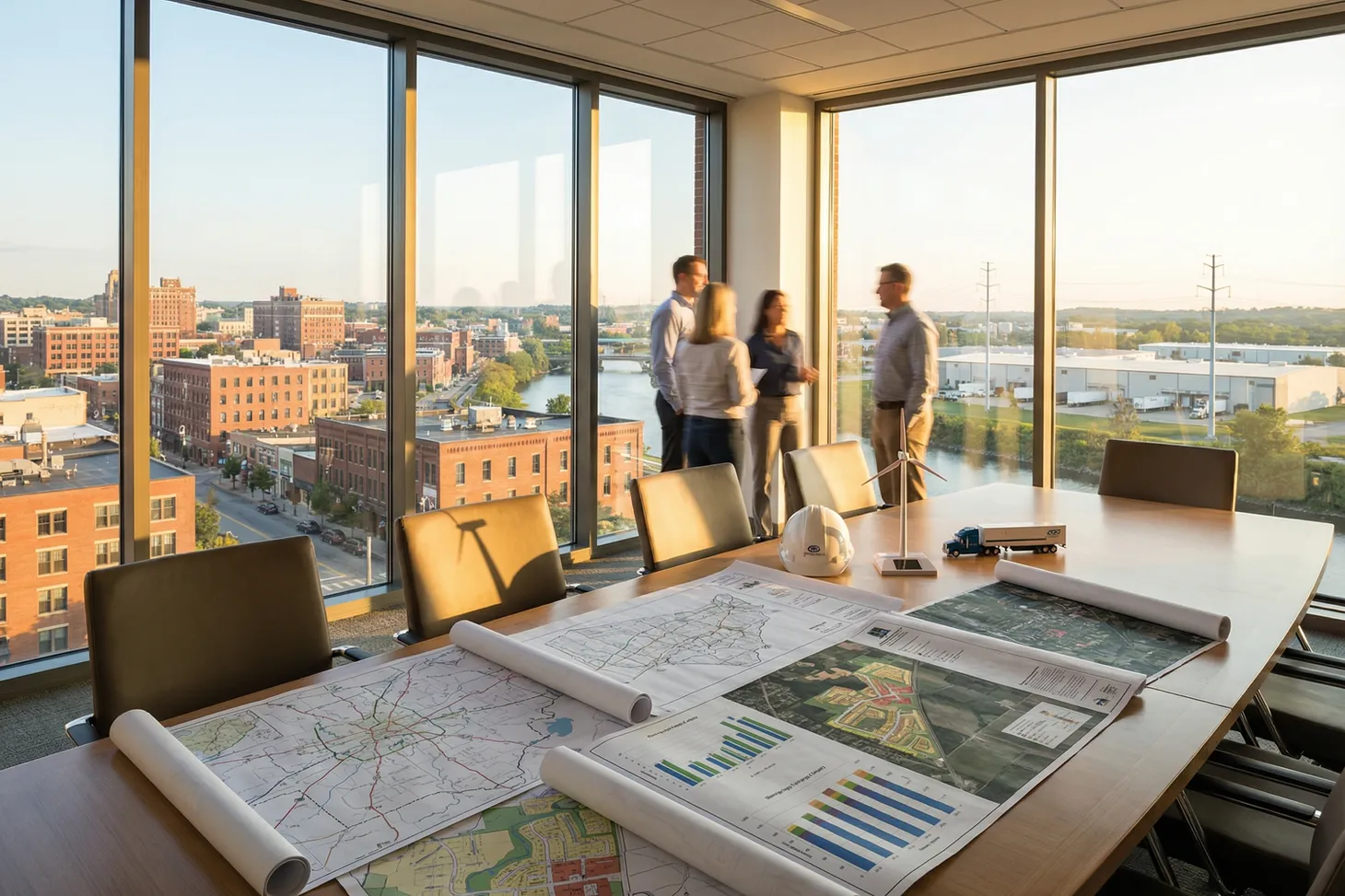Economic Development at Harvard University and Argonne National Labs With Lara Gale and Alison Turner
When Higher Ed Meets Nuclear Power: Boom Goes the Economy

Table of Contents
About this Episode
In episode #134 of the Econ Dev Show Podcast, Dane Carlson sits down with Lara Gale, Economic Development Program Manager for the Taubman Center of State and Local Government at Harvard Kennedy School, and Alison Turner, Senior Economic Development Researcher at Argonne National Laboratory.
Lara Gale and Alison Turner bring their extensive expertise and passion for economic development to the discussion, sharing their unique perspectives and strategic visions. They delve into innovative approaches to fostering growth and sustainability, emphasizing the importance of strategic planning and collaboration with various stakeholders.
Lara provides insights into her role at the Harvard Kennedy School, where she manages economic development programs and supports state and local governments through research and practical solutions. She highlights key projects and initiatives that have contributed to economic successes, including infrastructure development and community engagement strategies.
Alison discusses her work at Argonne National Laboratory, focusing on research-driven economic development. She explores the role of technology and data in shaping economic development strategies, sharing examples of how data-driven decision-making can identify trends, optimize resources, and create business-friendly environments.
Together, Lara and Alison address the unique challenges and opportunities in managing economic development in diverse contexts. They emphasize the significance of community engagement and partnerships in driving economic growth, highlighting the importance of building strong relationships with local businesses, educational institutions, and community organizations for a holistic approach to development.
This episode showcases the innovative work being done by Lara Gale and Alison Turner, providing valuable insights and practical strategies for economic developers and community leaders looking to drive positive change in their regions.
Like this show? Please leave us a review here — even one sentence helps!

The Econ Dev Show is brought to you by Dane's other project: Sitehunt.
Sitehunt is the AI-enhanced platform for building a comprehensive economic development property database, enabling hyper efficient RFI responses.
It is specifically designed (and priced) for both regional EDOs and very small and budget restricted communities.
Actionable Takeaways for Economic Developers
- Leverage Academic Partnerships: Collaborate with academic institutions to access cutting-edge research and resources. This can provide valuable insights and innovative solutions for economic development challenges.
- Utilize Data-Driven Decision Making: Emphasize the importance of data in shaping economic strategies. Use data to identify trends, optimize resource allocation, and create a business-friendly environment.
- Foster Community Engagement: Build strong relationships with local businesses, educational institutions, and community organizations. Engaging the community can lead to more holistic and sustainable economic development.
- Focus on Infrastructure Development: Prioritize infrastructure projects that support long-term economic growth. This includes transportation, utilities, and technological infrastructure that can attract and retain businesses.
- Encourage Strategic Planning: Develop comprehensive strategic plans that outline clear goals, strategies, and metrics for success. Ensure these plans are adaptable to changing economic conditions.
- Promote Sustainability: Integrate sustainability into economic development strategies. This includes promoting green technologies, energy efficiency, and sustainable business practices.
- Enhance Workforce Development: Invest in workforce development programs that align with the needs of local industries. This can include training, education, and partnerships with local educational institutions.
- Diversify the Economic Base: Focus on attracting a diverse range of industries to reduce dependency on a single economic sector. This can make the local economy more resilient to market fluctuations.
- Implement Technology Solutions: Adopt technology solutions that streamline operations and enhance service delivery. This can include digital platforms for business support, economic forecasting tools, and more.
- Evaluate and Adapt: Continuously evaluate the effectiveness of economic development initiatives. Use feedback and data to make informed adjustments to strategies and programs.
Other Sponsors
🫶 The Econ Dev Show is made possible by our Econ Dev Pro members (join now) and sponsors: EDOiQ, ResearchFDI, The PACE Group, and SiteHunt. (Become a sponsor.)
Episode Links
- Good Economics for Hard Times by Abhijit V. Banerjee, and Esther Duflo — The winners of the Nobel Prize show how economics, when done right, can help us solve the thorniest social and political problems of our day.
- Alison Turner | LinkedIn
- Lara Gale | LinkedIn
- Argonne National Laboratory
- Taubman Center for State and Local Government | Harvard Kennedy School
Edited Transcript
(This is an experimental AI edited transcript.)
Dane Carlson: Welcome back to the Econ Dev Show. Today, we're here with Laura Gale and Alison Turner. Laura is the Economic Development Program Manager for the Taubman Center for State and Local Government at Harvard Kennedy School, and Alison is a senior economic development researcher at Argonne National Laboratory.
Lara Gale: Thanks so much.
Dane Carlson: Laura, this was your idea to get us all together. Could you tell us more about what you do as an Economic Development Program Manager at the Harvard Kennedy School? We're all very interested in hearing about your work.
Lara Gale: Oh boy, I better justify my existence. If you don't know how Harvard is set up--and I certainly didn't before last October--they have multiple graduate schools, including the Harvard Kennedy School of Government. Each of these graduate schools has independent research centers. The one I work for is the Taubman Center for State and Local Government. This is an important distinction because the students who join our program are especially interested in policy as it impacts state and local levels of government. The students I work with as the manager of the economic development program are specifically focused on economic development at these levels. In a policy school that's focused on economic development across the whole world, our little piece of that is domestic economic development at the state and local levels.
Dane Carlson: Interesting. And Alison, the same question to you. What is Argonne National Laboratory, and what is an economic developer doing there?
Alison Turner: Argonne National Laboratory is one of many national labs across the country. Most national laboratories are funded by the DOE, at least in part. Argonne is one of those. We exist to do research--we're the research and development arm of the federal government, essentially, looking at big projects. If anybody saw Oppenheimer, that's really where the National Lab stuff came out of. Argonne's claim to fame is that we were the first national laboratory dedicated to using nuclear technology for peaceful applications to both domestic and global economies.
Where an economic development researcher comes in is, several years ago, in 2021, when COVID was hitting the entire globe, we collaborated with the Economic Development Administration to do some really in-depth local work on disasters for local economies. I work for the National Economic Research and Resilience Center out of Argonne, and we focus heavily on resilience. We look at shocks and stressors, such as natural disasters and large sector closures. For example, some shocks to economies include persistent poverty and inequality. We examine the lingering effects of these over time. We collaborated with the EDA to do some real in-depth work on these issues, aiming to build more resilient local economies.
Dane Carlson: That sounds like critical work, especially given the current climate. Can you give us some examples of projects you've worked on recently?
Alison Turner: Sure. One project we've been heavily involved in is assessing the economic impacts of the COVID-19 pandemic on various communities. We've been working on strategies to help these communities recover and become more resilient to future shocks. Another key project is focused on the energy sector, where we're looking at how shifts in energy production and policy affect local economies, particularly in areas heavily dependent on fossil fuels.
Dane Carlson: That's fascinating. Laura, could you share a bit about some of the initiatives you're currently working on at the Taubman Center?
Lara Gale: Absolutely. One of our primary initiatives is a comprehensive study on the effects of state and local policies on economic development outcomes. We're also working on developing best practices for local governments to foster economic growth sustainably. Additionally, we're partnering with other institutions to create training programs for local government officials, helping them navigate and implement effective economic policies.
Dane Carlson: It sounds like both of you are doing incredibly impactful work. For our listeners who are aspiring economic developers, what advice would you give them?
Lara Gale: My advice would be to stay curious and always be willing to learn. Economic development is a dynamic field, and there's always something new to understand. Networking is also crucial--connect with other professionals in the field, attend conferences, and stay engaged with current research.
Alison Turner: I completely agree with Laura. Additionally, I'd emphasize the importance of resilience--both in your work and personally. The field of economic development often deals with challenging situations, so it's important to stay adaptable and persistent. And don't be afraid to think outside the box; innovative solutions are often what drive real progress.
Dane Carlson: Thank you both for those insights. Before we wrap up, is there anything else either of you would like to add?
Lara Gale: Just that I'm grateful for the opportunity to share our work and hopefully inspire others to pursue careers in economic development.
Alison Turner: Likewise. It's been a pleasure talking with you, Dane, and with Laura. I hope our discussion sheds some light on the vital work being done in this field.
Dane Carlson: Thank you, Laura and Alison, for joining us today. Your work is truly inspiring, and I'm sure our listeners will find it valuable. To our listeners, thank you for tuning in to the Econ Dev Show. We'll see you next time.
Econ Dev Show Newsletter
Join the newsletter to receive the latest updates in your inbox.


